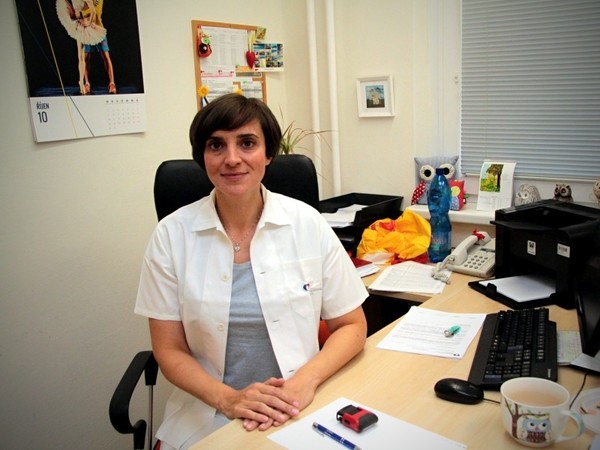To uncover biochemical processes and specific genetic mutations which play a key role in the formation of pancreatic cancer and influence the results of treatment of this disease – that is the main goal of the scientific research project which Beatrice Mohelníková Duchoňová is leading with her team at UP’s Departments of Oncology and Surgery in cooperation with the international consortium PANDoRA (PANcreatic Disease ReseArch). The results should contribute to gaining new information on the possibilities of timely diagnosis and therapy of one of the most deadly of all cancers.
Pancreatic cancer is a disease with a very serious prognosis: the majority of patients die within the first year, and less than five percent survive five years; hopes for a permanent cure treatment are minimal. “It is one of the worst diagnoses in oncology, despite that research into cancer has advanced significantly in the past twenty years. It’s typical that pancreatic tumours are diagnosed too late – the vast majority of patients no longer qualify for radical therapy, but rather fall under the category of palliative care. The problem is that the early stages of pancreatic cancer do not cause the patient any trouble, and they are difficult to diagnose with standard methods, such as ultrasonic examination of the abdomen," said Beatrice Mohelníková Duchoňová, who has been dedicating herself to molecular biological research of pancreatic cancer since she finished her medical studies.
Biomarker as a risk indicator
The scientist considers the future of systematic treatment for pancreatic cancer to be identification of new target structures – i.e. biomarkers, which are responsible for tumour growth and metastasis formation. Biomarkers can also determine the level of response to pharmacological and clinical treatment and contribute to an early diagnosis. It is to their discovery which the project Study of prognostic and predictive biomarkers for pancreatic cancer treatment is aimed, for which the team of Docent Mohelníková received grant support by a Czech Health Research Council Grant (AZV ČR). “Biomarkers in this project are represented by genetic variations of DNA, whose characteristics can help to determine to what extent the disease is determined on the genetic side, and which course of treatment to point at it,” the oncologist explained.
When searching for risk factors which influence the onset of pancreatic cancer, the scientists are comparing the DNA of patients in healthy control groups and searching for genetic differences. "If they happen to be statistically significant, then we can consider them as risk biomarkers. Thanks to that we can then predict on the basis of inherited genetic information who will have a high probability of developing a pancreatic tumour. It would define a subgroup of the population with whom it would make sense to undergo more complex diagnostic procedures in order to then discover the tumour in time,” Beatrice Mohelníková explained.
Another goal of the Olomouc experts is to profile subgroups of patients with pancreatic tumours, with whom it would be possible to treat differently than to date. “For example, with breast cancer there are already four known subtypes of tumours and one can choose a different therapeutic approach for each one. Molecular analysis of the tumour significantly helps individualise treatment in order for it to be the most effective, and indicates where to look for drugs for that treatment. These kinds of diametrically different changes have changed the prognosis in a number of tumorous diseases. Nothing like that however at present exists for pancreatic cancer,” Mohelníková emphasised.
From research to therapy: A long road to success
The researchers’ ambition is to arrive at an application in therapy based on knowledge gained. There is however a very long road which leads from basic research to therapeutic practise, containing extensive, difficult validation studies and laboratory procedures – both in terms of time and finances. “Our most extensive published studies for example are regarding genetic sequencing, which requires files containing thousands of patients, and associated costs in the hundreds of thousands of euros. In our conditions this is not possible, which is why we have created the studies in collaboration with more than a hundred European and American institutions," Mohelníková pointed out.
The possibility of publishing the results on large samples of the population was made possible to Olomouc scientists via international cooperation under the auspices of the research consortium PANDoRA, of which Beatrice Mohelníková is also a founding member. “We are active members within the consortium, we devise projects where our research should be headed, we carry out genetic analyses, and we have a number of interesting results,” she added.
In cooperation with the UP Department of Surgery and PANDoRA, Olomouc is on the cutting edge globally in the area of research on pancreatic tumours. Proof of that is not only the Czech Health Research Council Grant, but also promising results in the form of successful previous projects and dozens of publications in prestigious scientific journals with high impact factor. “In Nature Genetics we have just published important results about the discovery of four new gene variations connected with the onset of pancreatic cancer. With Martin Loveček of the UP Department of Surgery we have an article in press where we present the results of identifying subgroups of patients with metachronous or subsequent lung cancer metastasis. This type of tumour behaves differently – the patient lives longer and reacts to treatment,” Beatrice Mohelníková described.
